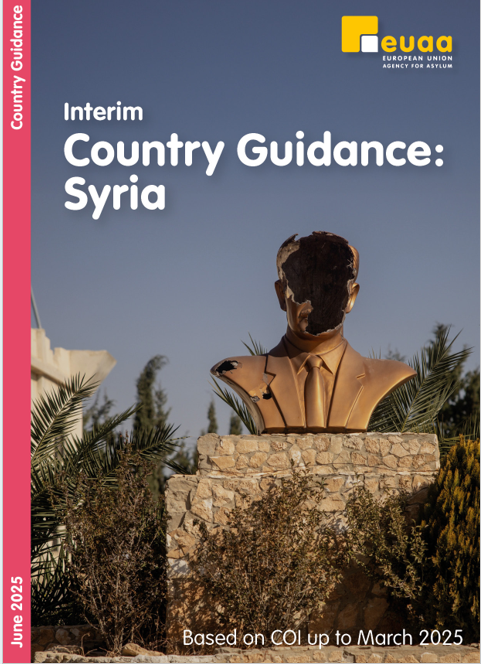
Interim Country Guidance: Syria
Publication date: 20 June 2025
The 'Interim Country Guidance: Syria' represents Member States' joint assessment of the situation in the country of origin in relation to the applicable international and EU legislation on international protection. The guidance note, accompanied by the common analysis, was agreed by the Country Guidance Network of senior policy officials in May 2025 and was endorsed by the EUAA Management Board in June 2025. It is based on COI up to 11 March 2025.
In addition to this electronic publication, the 'Interim Country Guidance: Syria' (June 2025) is available in pdf format.
The aim of the country guidance documents is to assist asylum decision-makers and policy-makers in their daily work and to foster convergence in the assessment of applications for international protection and the type of protection granted in the context of the common European asylum system. Member States have an obligation to take into account the common analysis and guidance notes when examining applications for international protection, without prejudice to their competence to decide on individual applications for international protection.
The EUAA country guidance documents are produced in accordance with Article 11 of the EUAA Regulation (Regulation (EU) 2021/2303). Learn more about the methodology and assessment approach of the common analysis and guidance notes in the 'Country Guidance: explained'.
‘Country Talk: Syria’
During the ‘Country Talk: Syria’, held on 25 July 2025, the EUAA presented the latest EUAA Interim Country Guidance on Syria, which was developed following the fall of the Assad regime and recently endorsed by the Management Board of the Agency. This event was also an opportunity to unveil the recent EUAA Country of Origin Information report on Syria, and to engage in a conversation driven by your areas of interest and questions.
The PPT presentation of the event is available here.
Citation
Please cite the document as: EUAA, Interim Country Guidance: Syria, June 2025, available at https://euaa.europa.eu/interim-country-guidance-syria
© European Union Agency for Asylum (EUAA), 2025
ISBN 978-92-9410-843-2
DOI 10.2847/5340778
Catalogue number BZ-01-25-039-EN-N

